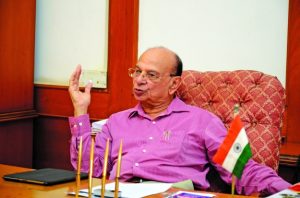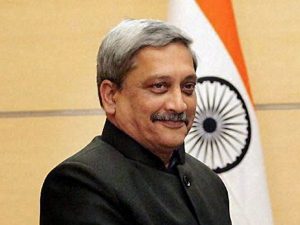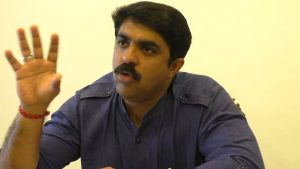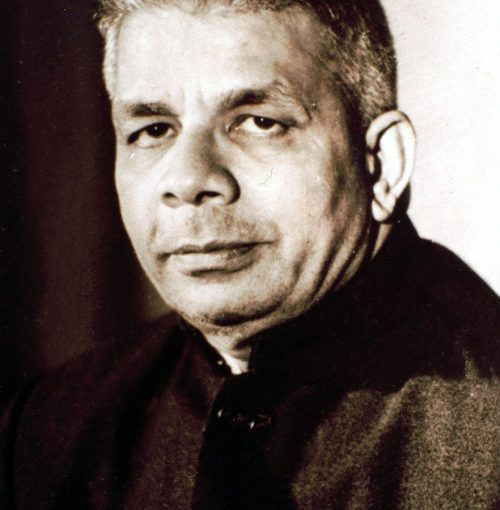LIBERATION: Voters re-elected Dayanand Bandodkar and the MGP even after they rejected merger with Maharashtra because the chief minister liberated the backward classes from the tyranny of the upper castes
Goan voters want their personal errands done including government jobs for their children. They even want their illegal structure regularised. They are not bothered about corruption as long as they can get their work is done
By Rajan Narayan
Right from the first election of the Legislative Assembly of the then union territory of Goa, Goans have been very shano. They have never voted for a party or an ideology. It has not mattered whether a candidate is a Konkaniwadi or Marathiwadi or an Englishwadi.
Goans have not been concerned with corruption cases against contesting candidates. They rightly believe that every politician is corrupt, and that even honest people will become corrupt when they join politics. Goans are only concerned with and therefore vote for the candidate who gets their work done, whether it is legal or not.
Goans are concerned over whether their elected representative will help their children get a government job. They don’t mind paying for jobs but want a guarantee that having taken the money, the politician will get it for them. The Goan voter expects the MLA to ensure that they get attention when they are admitted to Goa Medical College as it is well known that without influence you cannot expect even a glance from the ward boy, leave alone a doctor in any government hospital.
Event Sponsors
THE Goan voter expects the MLA to pay for pilgrimages to Shirdi and Valankani. They expect MLAs to sponsor music shows, sports tournaments and the annual narkasuras. A good MLA is one who takes care of voters by meeting all their demands. The elected representative is corrupt in Goa, but the voter is even more corrupt.

It has been proved time and again that only the crooks among MLAs get re-elected. The good, honest ones who may get elected by chance can never expect to be elected for a second term. All who get elected repeatedly, whichever party ticket they contest on, are the chors who are very generous in spending their money to meet voter demands.
The best example is Babush Monserrate, who can get himself and his friends elected from any constituency. It is money and muscle power which determines the outcome of an election in Goa.
Rogue Priests
ARCHBISHOP Filipe Neri Ferrao may threaten to issue guidelines on how Catholics should vote. But they do not listen. Even parish priests do not listen. Over the years, I have seen parish priests praising and supporting goons like Rudolf Fernandes, and dancing to the tunes of Babush Monserrate and Mauvin Godinho. The swamis of Partagali Mutt and Kavlem Mutt will always support the Saraswats, however corrupt they may be. The logic is that they may be corrupt, but they are ’amche’.
This ajeeb or rather practical behaviour of Goans has been evident since the first elections. They voted for leader Dayanand Bandodkar of the Maharashtrawadi Gomantak Party (MGP) which want to merge with Maharashtra not because they were in favour of Marathi but because he helped the Bahujan samaj.
They voted for him because he united all the backward classes and challenged the monopoly of the Brahmins and chardos, because he enacted the Tenancy and Mundkar Acts so the land would go to the tiller and not the bhatkars, because he made education available to all, irrespective of caste, community or economic status unlike the Portuguese era when education was a privilege of the higher caste. They voted for Bandodakar even after the merger was rejected during the opinion poll because he was considered a good man who helped the poor people of Goa.
Arrogant Daughter
ONE must not speak ill of the dead. But the ground reality is that Sashikala Kakodkar, Bandodkar’s daughter who succeeded him, was as corrupt and arrogant as he was humble and clean. The first to revolt were her colleagues in the MGP. It is not widely known that among the first defectors in Goan politics was Pratap Singh Rane who was Revenue minister in her cabinet. With the ministry toppled and the United Goans joining the Congress, a new era began in Goan politics. The fight was limited to the Congress and the MGP until the leaders of the MGP betrayed the party for 40 pieces of silver.
In the first elections after statehood when the number of seats in the assembly was increased to 40, the Congress formed the government securing a majority. During the language agitation, many mercenaries were permitted to join the Congress. These included Churchill Alemao and perhaps even Luizinho Faleiro who supplied the money and muscle power for the Konkani agitation. Alemao demanded the sports portfolio as a reward. When he was denied it, he led a revolt of Congress MLAs under the leadership of then Speaker Proto Barbosa against the Rane government.
The government collapsed on May 30, 1987 and heralded a period of total chaos in Goan politics. Churchill Alemao became chief minister for exactly 17 days between March 27 and April 14, 1990 until Proto Barbosa took over. Barbosa in turn was toppled by the Congress primarily because of the horse trading by Dr Wilfred D’Souza who was then president of the Congress. Dr D’Souza wanted to become chief minister, but to topple the Barbosa government, he needed the help of Ravi Naik. Barbosa was chief minister for eight months from April 14, 1990 to December 14, 1990.
Ravi Defection
IN HIS greed for power, Ravi Naik, who started life as a motorcycle pilot, decided to abandon the MGP, of which he was acting president, on the promise that he would be made the chief minister. He was following the example of Ramakant Khalap who had taken seven MLAs from the MGP and joined Barbosa to become deputy chief minister in the Progressive Front Government. A disqualification petition was filed against Naik and he was forced to step down in favour of Dr Wilfred D’Souza.
Unfortunately for Dr D’Souza, the Supreme Court overturned Naik’s disqualification and the then corrupt governor dismissed the D’Souza government and returned Naik to the chair without consulting the central government. Furious, the central government sacked both the governor and Ravi Naik who could remain chief minister only for six days – from April 2-8, 1994. Dr D’Souza was reinstated as chief minister on April 8, 1994 and continued till December 16, 1995.
In the 1994 elections, the Congress again won a majority and the high command appointed Pratap Singh Rane as chief minister. An angry Dr Wilfred D’Souza, who was expecting to be given the chair, revolted towards the end of the term and formed the government on July 29, 1998. This government lasted only until November 23, 1998 as it was toppled by Luizinho Faleiro.
If Catholics have not been able to complete their full terms, it is because their fellow Catholics have always acted like crabs. In 1999, the Congress again managed to get a majority and Luizinho Faleiro was made chief minister on June 9, but his government lasted only for seven months until November 24, 1999.
Catholic Judas

FALEIRO was betrayed by another Catholic, Francisco Sardinha who became chief minister on November 24, 1999 with the support of four Bharatiya Janata Party (BJP) MLAs headed by Manohar Parrikar. The latter withdrew support to Sardinha in less than a year and toppled his government on October 23, 2000. Parrikar served as chief minister from that day until February 2, 2005.
He could not complete a full term as he was toppled by the Congress with Rane taking over as chief minister for a brief period from February 3, 2005 to April 4, 2005. This was followed by president’s rule until June 6, 2005 when Rane became chief minister again from June 7, 2005 to June 6, 2007.
In the 10 years between 1987 and 2007, there were 15 governments. The first stable government to last for five years after statehood was of Digambar Kamat who completed his full term from August 6, 2007 to March 8, 2012. Parrikar replaced him on March 9, 2012 but resigned and went to Delhi as Defence minister on November 7, 2014 to be succeeded by Laxmikant Parsekar.
Goans have always voted for individuals who they feel will do their work rather than those who are honest or belong to a particular political party. Even the few honest candidates who were accidently elected like retired Allahabad Supreme Court judge Ferdinho Rebello during the Janata wave and writer Udhay Bhembre were not elected for a second term.
Significantly the majority of the members of the Legislative Assembly failed to get elected in the following election. The only exceptions have been Pratap Singh Rane who has won every election he has contested since his first in 1967, Babush Monserrate who has won from both Santa Cruz and Taleigao and is planning to contest from Panjim this time, and Digambar Kamat who has not lost an election since 1999 when he first contested on a BJP ticket and in the 2012 election which he contested on a Congress ticket. Other MLAs who have won successive elections are Pandurang Madkaikar from Cumbarjua and Babu Kavlekar from Siolim.
In contrast, many of the biggest politicians in Goa have bitten the dust. Luizinho Faleiro, who was elected more than five times from Navelim, lost to Churchill Alemao in 2007 and moved to Delhi as general secretary. Churchill, who started the toppling game in the 90s, was defeated by Avertano Furtado from Navelim in 2012. Similarly Congress heavyweight Francisco Sardinha also lost the elections. Willy, who was always the kingmaker but never the king, paid for the arrogance and corruption of his personal assistant Tarzan Demello, a former motorcycle pilot.
Jumping Parties
VIRTUALLY every MLA in Goa has jumped parties. Madkaikar, who joined the BJP, was earlier with the Congress. Mauvin Godinho has been a Congress MLA for 20 years, and is now switching to the BJP. Azgaonkar has jumped political parties whenever it suited him. Indeed, most of the BJP MLAs are former MGP MLAs, with the exception of Parrikar. Very few have been re-elected in Goa because it is not easy to be an MLA here.

The problem with Goa is not corrupt politicians but corrupt voters. The voters expect the MLA to do all their personal work. They expect them to solve their tenancy and mundkar problems, get them government jobs though they are willing to pay for them, pay for medical expenses or talk to the dean of GMC for special treatment, sponsor events, contribute to building narkasuras and New Year’s old man effigies.
You cannot be an MLA without being corrupt as an honest person cannot meet the demands of the voters. The situation is further complicated by migrants who will only vote if the candidate arranges a ration card and Aadhaar card, medical card and gives them benefits of Laadli Laxmi and Grihadaar schemes whether they are eligible or not. They also expect sarees, scooters, television sets, cash, biryani and drinks on the night before the elections.
Will it be different this election? Unlikely. The Ranes will win from Sattari, but the future of the Congress is bleak. Madkaikar has joined BJP with Mauvin Godinho. Babush Monserrate has set up his own party and is planning to contest from Panjim. Babush may also spread his net to Santa Cruz, Taleigao and even St Andre. He will break the monopoly of the BJP over the Panjim seat which has been held by Parrikar.
The chances of the BJP are not much better. The MGP has broken its alliance with them. It is unlikely that Catholics who helped the BJP secure a clear majority in 2012 will support the saffron parivar. The Navelim MLA has rejected the invitation to join the BJP and insists on contesting as an independent. The Goa branch of the Rashtriya Swayamsevak Sangh which is still loyal to its local chief Subhash Velingkar will do its best to defeat the BJP. The party will not have the benefit of the inspirational leadership of Parrikar who has made it clear he wants to remain at the centre. The result will be that the BJP will get fewer seats then the Congress did in the last elections.
Hindu Majority
THAT leaves the MGP-Bharatiya Bhasha Suraksha Manch (BBSM) combine, the Aam Aadmi Party (AAP) and the Goa Forward party. Nobody is likely to take the Goa Suraj party seriously. The MGP-BBSM combine may not find many takers because of its stand on the medium of instruction issue. The majority of Hindus now prefer sending their children to English-medium schools.
Besides, the Dhavalikar brothers are tainted by their association with Sanatan Sanstha which is implicated in the murder of three rationalists. The MGP is unlikely to improve its position significantly. Goa Forward has a good chance if it organises itself. The AAP has not managed to catch the imagination of Goan voters.
The probable outcome is a khichdi. It may not be as tasty as kebabs, but it is healthier for a democracy.
